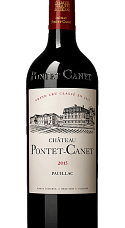Château Pontet-Canet 2019
Descripción
El château que elabora este tinto está clasificado como Cinquième Cru. El viñedo es colindante, además, con las parcelas de la prestigiosa bodega Château Mouton Rothschild. Aseguran sus elaboradores que esta añada 2019 "es una promesa de voluptuosidad para todos los amantes del vino", y así lo confirman las altas puntuaciones otorgadas por la crítica.
Ficha técnica
Cata
Viñedo y elaboración
Opinión de los críticos
Deep dark ruby, opaque core, purple reflections, subtle brightening on rim. For the first time since 2011, the proportion of Merlot is somewhat higher, the bouquet accordingly more characterised by heart cherries than by the usual cassis de Pauillac, delicate nougat and caramel, fine herbal spice. Powerful, tightly meshed, shows good expression, chocolatey touch, ripe tannins, great complexity, great length and spiciness, a very independent personality, a huge promise for the future, already evident: this wine has everything a world-class wine needs.
The aromas to this are really amazing, with a potpourri of spices and dried flowers, as well as redcurrants, sweet plums and even some peaches. Full-bodied with layers of ripe fruit and ultra-fine tannins that spread across the palate in an encompassing yet always elegant and pure way. It’s succulent and unadulterated. Like crushed, perfectly ripened grapes. The length is rather endless. The tannins build. Fabulous young red. 35% in amphora and the rest in 50% new oak and 15% one-year oak. 65% cabernet sauvignon and 30% merlot, the rest cabernet franc and petit verdot. From biodynamically grown grapes. Try after 2028, but an absolute joy to taste now.
The wine is so perfumed, with ripe tannins set beside the black currant purity. The wine does have weight but the fruit is so refined and vibrant. Tannins give a core for aging, offering the structure and the density of a very fine wine. Organic and biodynamic.
The 2019 Pontet-Canet offers up an expressive bouquet of plummy fruit, kirsch, dried herbs and peonies. On the palate, it's full-bodied, ample and seamless, with melting tannins, succulent acids, and a long, liqueured finish. Tasted twice, it's a wine I find somewhat perplexing: in a blind tasting, I might be more inclined to place it in Gigondas than Pauillac. I'm far from dogmatic when it comes to what the French call "typicité," and stylistic diversity surely enriches every appellation; but by the same token, I'm not convinced that this is the most compelling aesthetic that a Cabernet-based blend from this part of Bordeaux can realize. Checking in at 13.7% alcohol, some 35% of the production was matured in amphorae, which no doubt contributes to the wine's idiosyncratic identity.
The 2019 Château Pontet Canet checks in as a blend of 65% Cabernet Sauvignon, 30% Merlot, 3% Cabernet Franc, and 2% Petit Verdot that was brought up in a mix of barrels and concrete tanks. It shows the new style of the estate with a more savory, exotic, medium to full-bodied style that's a dramatically different beast than the benchmark 2009 and 2010 vintages, which to my mind, are the greatest vintages from this estate to date. The 2019 has a ruby/plum color as well as a perfumed nose of redcurrant and mulberry fruits as well as notes of brambly herbs, woodsmoke, peony, leather, and cedar pencil. It's aromatic and complex, although certainly not classic Pauillac, and on the palate, it’s medium to full-bodied, with firm, savory, yet quality tannins, good balance, and outstanding length. It warrants 7-8 years of bottle age and will evolve for 30+ years. While the style of the estate has been gradually shifting with the winemaking moving to hand destemming and aging in concrete and amphora, this is the first time where the winemaking seems to dominate the wine, and the quality is unquestionably not at the same level.






Añadas: 2023 2022 2019 2017
Esta añada no tiene valoraciones todavía. Pincha en las otras añadas para ver sus valoraciones.
Esta añada no tiene valoraciones todavía. Pincha en las otras añadas para ver sus valoraciones.
Esta añada no tiene valoraciones todavía. Pincha en las otras añadas para ver sus valoraciones.